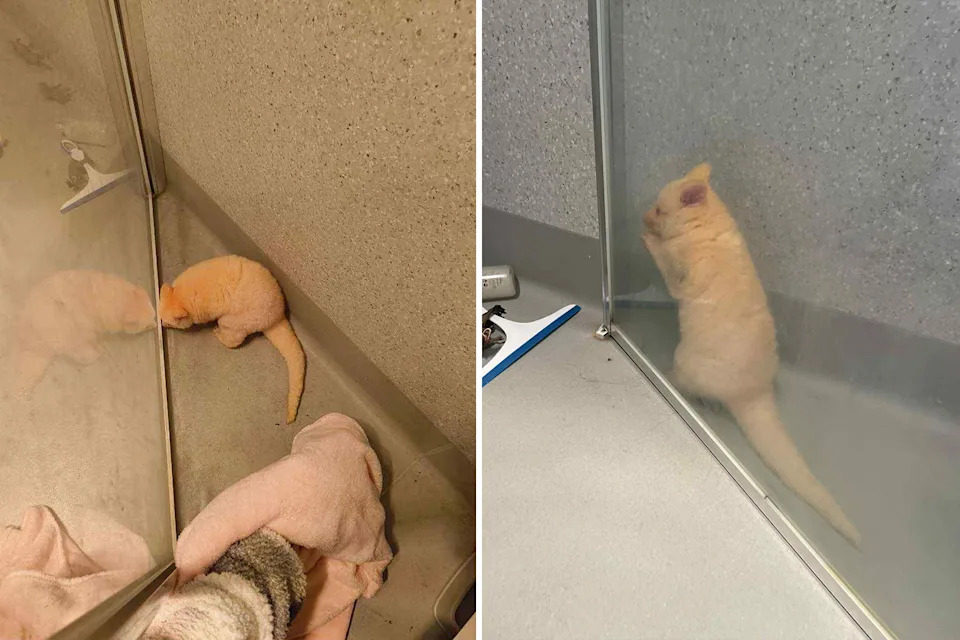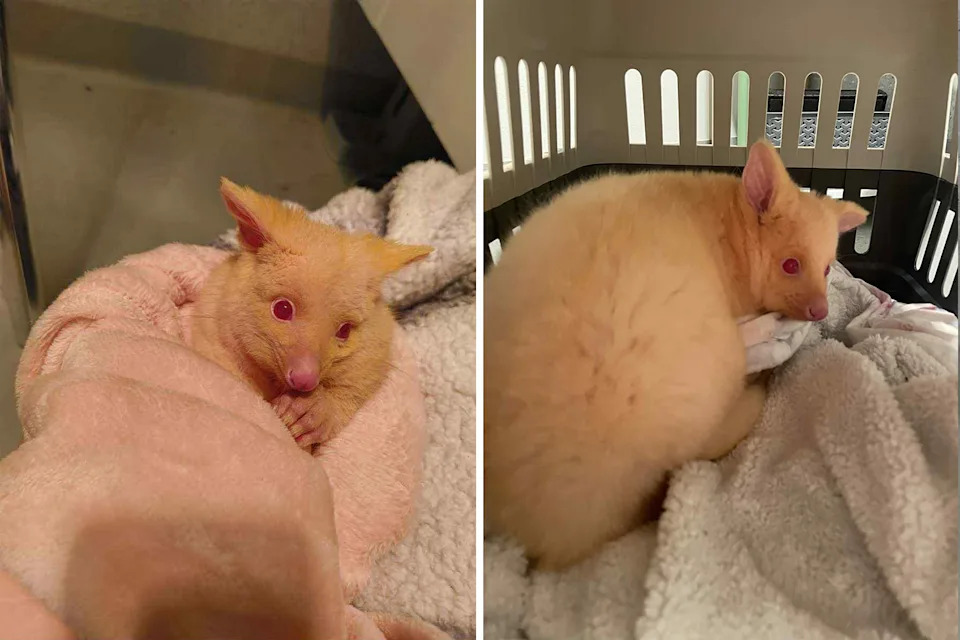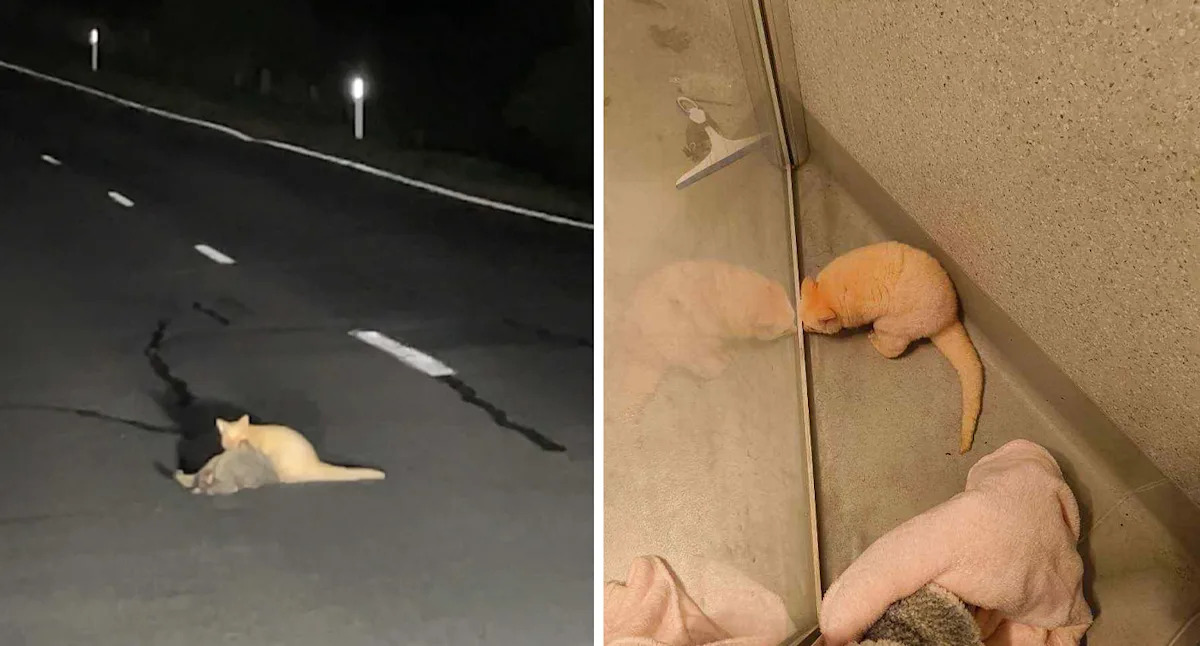During a late-night drive to lull their two kids to sleep, an Aussie couple were “shocked” by an animal so bright it glowed in their headlights. There are no streetlights along the backroads of Launceston, and Chelsea Pettit first guessed the strange creature was a cat.
“I said to my partner, Oh my God, what’s that?” she said, before her partner turned the car around.
Speaking with Yahoo News Australia last night, Chelsea revealed she “didn’t even think twice” before jumping out of her car and running towards the animal in the middle of the road, with a blanket she grabbed from one of her kids.
“I don’t know whether it was my motherly instinct or that I grew up on a farm around animals. My only thought was to get it off the road,” she said.
As she got closer, the penny dropped that she was looking at one of Tasmania’s almost mythical golden possums. Even more startling was that this individual was also a rare albino, with red eyes.
“She was staring up at me the whole time, like she was terrified, the poor thing,” Chelsea said. “She did not want to leave her mum.”
Related: 🚨 200 deaths in just two years: Devastating toll of deadly Aussie road

The possum made several attempts at escaping. Source: Chelsea Pettit
The possum’s mother was a regular brown brushtail. Sadly, the youngster couldn’t comprehend that she was dead and that her life was about to dramatically change. Had Chelsea not grabbed the possum and bundled her into the car, she likely would have been flattened as well.
“A log truck came not even two minutes later, speeding through, cleaned up mum,” she said.
How bad is Tasmania’s roadkill problem?
Evidence suggests that between 500,000 and 1 million animals are killed on Tasmania’s roads every year, with wildlife rescuers dubbing the state the “roadkill capital of the world”.
Tasmania is lucky to have an abundance of brushtail possums. The species has been killed off across 80 per cent of its original range on the mainland. Rarer animals like the Tasmanian devil also frequently fall victim to speeding trucks and cars.
Bonorong, the state’s biggest wildlife rescue service, would like to see a statewide study to determine how to mitigate the problem. Its director Greg Irons quipped that Tasmanians aren’t worse drivers than other Australians, “it’s just there are so many animals here,” he said.
“That research would be crucial to pressuring change. It’s hard — roadkill is such an accepted part of life for Tasmanians. But I’ve had people come here and they just cannot believe the carnage,” he said.
“If we could even drop the number by 20 per cent, we could be talking about hundreds of thousands of lives.”

The golden possum was taken into care after spending the night at Chelsea’s house. Source: Chelsea Pettit
What happened to the golden possum?
Chelsea kept the possum in her bathroom overnight, and after several escape attempts, she slept warm and safe in a cat carrier. And in the morning, took her away for assessment and care.
What happens once the animal grows up remains unclear. In Tasmania, there is debate over whether golden possums should be released into the wild, because their bright colouring is a negative genetic trait.
“When they’re born like that, their chance of survival is going to be a bit less, because obviously they stand out like a sore thumb,” Greg said.
There are several populations of golden possums, including at Launceston and at Mount Nelson near Hobart. It’s normal for the mother to be a different colour to her baby because the genetic mutation tends to skip a generation.
What should I do if I see a golden possum?
Bonorong receives four to five calls about them every year. They face the same problems as other wildlife, including vehicle strikes, dog and cat attacks, poisonings, and disease.
Along with concerned queries about sick and injured golden possums, it also receives calls about perfectly healthy individuals. So Greg advises it’s always best to call before trying to intervene.
“A few times people have trapped them, thinking they need help or that we might want it,” Greg revealed.
“Other people have asked if they should do something, but our advice is generally to leave them alone and enjoy them.”
Love Australia’s weird and wonderful environment? 🐊🦘😳 Get our new newsletter showcasing the week’s best stories.


